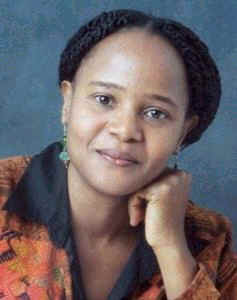| Want to send this page or a link to a friend? Click on mail at the top of this window. |
| More Books and Arts |
| Posted September 10, 2007 |
| EDWIDGE DANTICAT/THE INTERVIEW | ||
Fitting Together the Pieces of a Tragedy |
||
 |
||
Edwidge Danticat (Nancy Crampton) |
By ANA MUNDOW |
Edwidge Danticat was raised by her aunt and uncle in Haiti and joined her parents in the United States when she was 12. Her peerless fiction includes "Breath, Eyes, Memory" and "The Dew Breaker." In 2004, when Danticat was pregnant with her first child and while her father was dying of pulmonary fibrosis, her uncle, an elderly churchman, was forced to flee the violence in Haiti.
Despite having documentation and having visited America before, a frail Joseph Danticat was first detained by US Customs, then shackled and imprisoned. Without his medication, he died within days. Earlier this year, The New York Times reported that 62 immigrants have died in US administrative custody since 2004. "Brother, I'm Dying" (Knopf, $23.95), a model of grace and restraint, tells the story of Uncle Joseph, of the Danticat family, and of their country.
Danticat spoke from her home in Miami.
Q: Was it hard for you to reveal yourself and your family this way?
A: What made it less difficult was the fact that we all had this grief in common. I'm very conscious of the self-indulgence of writing about oneself, but there was more than just our pain happening, for my uncle certainly but also for my father. It was a way of paying tribute to them.
Q: This is part memoir, part reconstruction. What sources did you draw on?
A: I drew a lot on the official documents of my uncle's detention. The final document we got from the inspector general in Washington was in fact a retelling of all the interviews in the process. It was almost like one of those novels where you get the point of view of every character, including my uncle's. . . . We had to fight hard to get these papers under the Freedom of Information Act. I also drew on stories from my aunt Zi, who was the last person my uncle spent a lot of time with. It's a strange thing to say, but I felt as if every other thing I had written was like training for this.
Q: Did you feel that you were giving lives to people we see - if at all - solely as victims?
A: I think that was the driving force. Going through the detention bureaucracy with my uncle and going to see many doctors with my father, you know that what they see is this old man who is poor, who is Haitian. That he is a person is not of any concern to them. You want to say, "This is a man, a great father, his life matters." In fiction you do that when you write characters. But there's ambivalence too, because there were parts I just wanted to keep for myself.Continued...
Q: When your uncle died in detention, was that your first glimpse of a different America?
A: It really wasn't. My parents with their church used to visit detainees at the Brooklyn Navy Yard. And here in Miami I used to visit detention centers, so this was a reality I knew. I think that made it more horrific, I couldn't lie to myself. Of course it's different when it's someone you love. What was most striking to me was these people who are supposed to speak for the government saying "It was his time, we all have to die," calling my uncle's medicine "voodoo medicine." Then we read the New York Times article about people dying in detention, and it was the same story. Except that I was in the fortunate position of having, if not a big mouth, then a big pen. Other families haven't got that.
Q: Yes, one of the questions on the form the detaining officer fills in is "Congressional or media interest?"
A: I know, I kept thinking if they had known I was a writer would that have made a difference. It shows how important it is to speak out, to share your story. I also kept feeling that if only one person in the process had acted humanely and said this is a very sick old man, things would have turned out differently.
Q: You ask "Was he going to jail because he was black?" Was he?
A: Certainly because he was Haitian, because there is a specifically unfavorable policy toward Haitian refugees, especially in Miami. If it had been an 81-year-old Cuban or European asking for asylum, I'm pretty sure he would have been treated differently.
Q: Why do you describe the most harrowing moments so dispassionately? A: I did not want to write an angry polemic. These things speak for themselves. The details from the report, the medical records of my uncle's death, I want the reader to come across those and wonder how could someone have this information and make such disastrous decisions for the life of an old man.
Q: Has your family had any redress?
A: None. The report from the inspector general of the Department of Homeland Security concluded that nobody did anything wrong. I guess this book is our only redress.
Anna Mundow is a correspondent for the Irish Times. She can be reached via e-mail at ama1668@hotmail.com.
© 2007 The New York Times Company. Reprinted from The Boston Globe of Sunday, September 9, 2007.
RELATED TEXT: Brothers, I'm Dying
| Wehaitians.com, the scholarly journal of democracy and human rights |
| More from wehaitians.com |